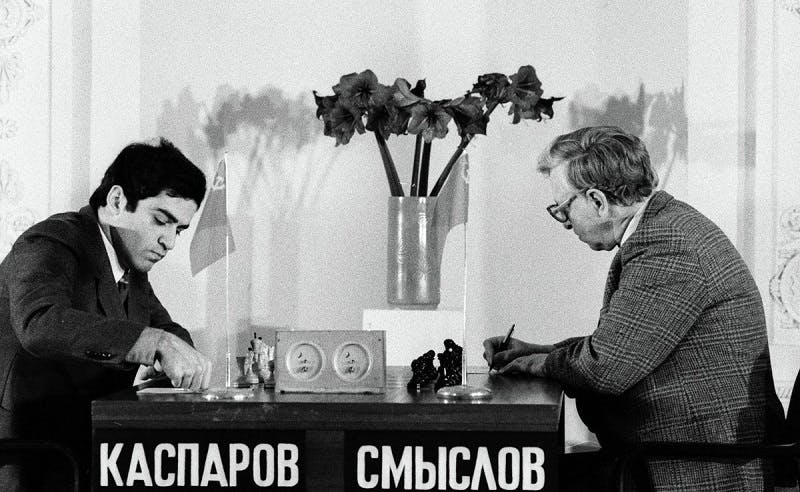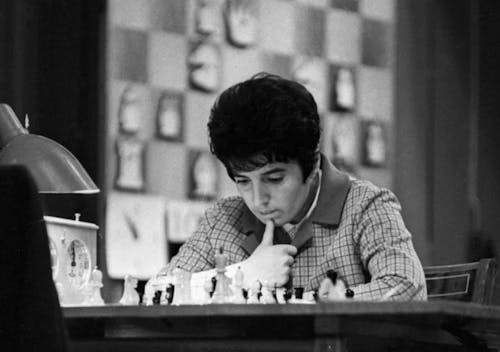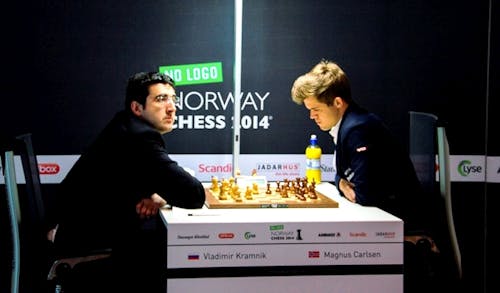Are you sure you want to delete your account?
(This will permanently delete all of your data - purchases, game scores, ratings, etc)
Change your username
Your current username is: guest
Change your account email address
Your current account email is:
Redeem your Fampay code here!
Use your Fampay code to get access to the Play Magnus Plus Membership!

At What Age Do Chess Players Peak?
One of the most famous examples of longevity in top-level chess is Vassily Smyslov reaching the Final of the Candidates matches against Garry Kasparov in 1984. Smyslov turned 63 during the match, while Kasparov celebrated his 21st birthday on the last day of the confrontation – three to one age odds!
Nowadays, when you're not a Grandmaster at 14, you can forget about it.
Viswanathan Anand
If you like following live top chess events, such as the Champions Chess Tour or other high-profile tournaments, you have probably noticed that the commentators often mention how old the competitors are. They draw parallels between the players' ages and FIDE ratings and make some conclusions on the participants' prospects. Professional chess is a tough race: you have to stand out from the crowd as early as possible to make it into the elite circuit of regulars who frequent all the most prestigious events in the world.
Having access to modern technologies, especially the top engines that are getting closer and closer to playing perfect chess, allows kids to progress more quickly than ever. Currently, the record for being the youngest Grandmaster is held by ex-challenger Sergey Karjakin, who obtained the highest chess title at the age of 12 years and 7 months. When the feat was achieved back in 2003, it seemed like it will hold forever. Now we can't be so sure. In May 2021, 12-year old American chess prodigy IM Abhimanyu Mishra earned his second GM norm. He still needs one more GM norm and a few dozen rating points to break Karjakin's achievement, but he is dangerously close, hinting that there will be other contenders for overtaking the record in the nearest future.
That being said, the older generation is not giving up just yet. Of course, nowadays, it is not possible to be a World Chess Champion at age 58, like was the case with Wilhelm Steinitz. Nevertheless, in 2012 the chess crown was at stake in the World Chess Championship match between Viswanathan Anand (42) and Boris Gelfand (43). Moreover, 44-year old Anand won the Candidates Tournament in 2014. Such motivational stories prove that certain unique people are capable of performing brilliantly at age 40+. Still, if we look at the current top-10 of the FIDE list in classical chess, all the players there are either in their 20s or 30s. The youngest is Anish Giri (26), while the oldest is Levon Aronian (38).
Anyway, at what age are you supposed to reach your peak in chess? The answer to this question depends on such qualities of the person as physical and mental health, motivation, tournament experience, and numerous other factors. Many chess experts believe that most top chess players peak somewhere around age 35-40. For instance, this figure is given by GM, Dr. of Science in Psychology Nikolai Krogius. However, as usual, a lot depends on the definitions. If we mean relative strength, e.g., becoming the World Chess Champion, then quite a few people have achieved this feat in their 20s. Some of the names that come to mind are Garry Kasparov (22), Magnus Carlsen (22), Mikhail Tal (24), Anatoly Karpov (24), Vladimir Kramnik (25). However, in terms of absolute playing strength, all of them kept improving their play even after winning the World Chess Championship. Notably, Mikhail Tal, the youngest ex-WCC in the history of the game, used to say that he would have crushed "Misha Tal-1960" had he played the young version of himself at a later stage. In other words, he was getting better as a chess player, but the competition was progressing at an even faster rate.
In case you are interested, here are the ages at which some of the Classical World Chess Champions reached their rating peaks (let's leave rating inflation out of the discussion since this topic tends to cause holy wars):
Mikhail Botvinnik, 2690 (unofficial, April 1968, 56 years)
Vassily Smyslov, 2630 (unofficial, April 1968, 47 years)
Mikhail Tal, 2705 (January 1980, 43 years)
Tigran Petrosian, 2660 (unofficial, June 1967, 37 years)
Boris Spassky, 2690 (July 1971, 34 years)
Bobby Fischer, 2785 (July 1972, 29 years)
Anatoly Karpov, 2780 (July 1994, 43 years)
Garry Kasparov, 2851 (July 1999, 36 years)
Vladimir Kramnik, 2817 (October 2016, 41 years)
Viswanathan Anand, 2817 (March 2011, 41 years)
Magnus Carlsen, 2882 (May 2014, August 2019, 28 years)
FIDE World Chess Champions:
Alexander Khalifman, 2702 (October 2001, 35 years)
Ruslan Ponomariov, 2764 (July 2011, 27 years)
Rustam Kasimdzhanov, 2715 (May 2015, 35 years)
Veselin Topalov, 2816 (July 2015, 40 years)
As you can see, with a few exceptions, some of which will be explained below, pretty much all the World Chess Champions peaked rating-wise somewhere between 34 and 43.
Please note that Mikhail Botvinnik, Vassily Smyslov, and Tigran Petrosian were probably past their primes when the Elo system was introduced. Also, we don't know what heights Bobby Fischer could have reached had he not quit chess at a young age. And Magnus Carlsen is an active player who has all the chances to improve on his personal best in the future. The easiest way to track his progress (or regress!😅) is to take on the reigning World Chess Champion in the Play Magnus app, where you can play against his AI clone at any age you like.
It is common for professional players to retire somewhat prematurely due to burnout, loss of motivation, financial problems, failure to progress, and other similar reasons. For amateur and semi-pro players, age is less important because most of them have by far not exhausted their potential for improvement. Hence, if you are a bit older than 35 and haven't played chess professionally since early childhood, your age should not worry you too much chess-wise. For example, compared to pros, amateurs usually build up experience much slower since they don't play as many games per year. Consequently, it is not unheard-of for some people to take on chess seriously and improve their personal bests even in their late 40s and 50s.
Last but not least, you can let go of the Elo trap at any age and enjoy playing chess! It is such a great game, after all, so good luck and have fun!
Are you interested in learning more about the World Chess Champions mentioned in the article? Download Magnus Trainer, where you will find interactive lessons about all the World Chess Champions and their challengers, allowing you to see whether you can play as well as them or even improve on their game!

